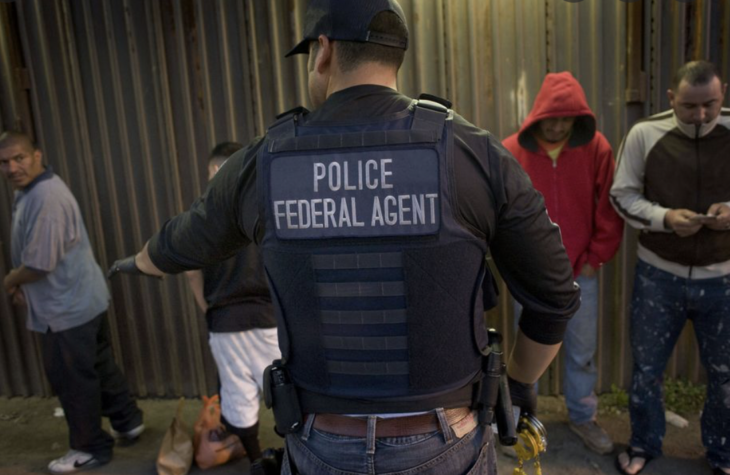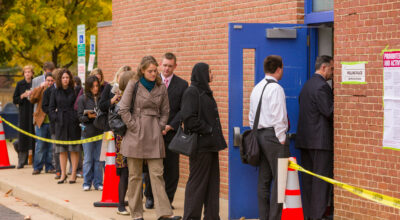
Policy Brief: Assessing State Policies Amid the Border Crisis
Summary:
The ongoing illegal immigration crisis has metastasized into a full-blown national security and humanitarian disaster. Current levels of illegal immigration, human trafficking, and drug smuggling are unprecedented. Fiscal Year 2021 saw a historic record of nearly 1.7 million illegal immigrant apprehensions at the U.S. southern border. Customs and Border Protection (CBP) released the final figures for the fiscal year on October 22, 2021.
Texas Overview:
With 1,241 miles of border shared with Mexico, Texas remains the focal point of the border crisis. Of the nine total sectors along the U.S.-Mexico border under CBP’s command, five are found along the Texas-Mexico border. These include the El Paso, Big Bend, Del Rio, Laredo, and Rio Grande sectors. In all, Texas constitutes 64 percent of the 1,954 total land miles of border shared with Mexico.
Governor Greg Abbott has implemented a number of measures in response to the flow of illegal imigration to ameliorate the crisis. In March 2021, Governor Abbott launched “Operation Lone Star,” which activated the Texas National Guard and integrated the Department of Public Safety (DPS) alongside National Guard units to provide additional personnel at the border. Additionally, Governor Abbott declared a state of disaster in all 34 border counties on May 31, 2021 due to the “surge of individuals unlawfully crossing the Texas-Mexico border.”
In a first, the Texas National Guard has been instructed to arrest illegal aliens utilizing state trespassing laws.
In June, Governor Abbott hosted a border security summit and invoked the Emergency Management Assistance Compact providing for other states to send available law enforcement personnel to Texas to assist in making arrests and detaining individuals crossing illegally.
The Texas legislature has passed several bills this year amid the crisis to fill the void being created by willful federal negligence. This includes two border security bills totaling nearly $3 billion. These bills include $1 billion for construction of new border barrier and fencing, $154 million for deployment of Texas DPS in border security operations, and over $300 million in funding for the continued deployment of 2,500 Texas National Guard to the border.
Attorney General Ken Paxton successfully led the lawsuit against the Biden administration that secured reinstatement of the Migrant Protection Protocols (MPP), otherwise known as the Remain in Mexico policy. That policy had required illegal immigrants and asylum-seekers to return to Mexico to await adjudication of their immigration proceedings prior to its termination on June 1, 2021 by Secretary of Homeland Security Alejandro Mayorkas.
The Fifth Circuit Court of Appeals ordered the Biden administration to reinstate the policy, and the Supreme Court declined to intervene due to the administration’s failure to “show a likelihood of success” on the claim that its decision to terminate MPP was not arbitrary and capricious. One month after its loss in court, the Biden administration announced its intention to issue a new memorandum to terminate the MPP to “address the concerns raised by the courts.”
This new DHS memorandum was issued on October 29, 2021 and contends that the administration will continue to work toward the MPP’s ultimate termination. However, administration officials recently announced their intention to temporarily reinstate the MPP “to comply with a district court injunction” following an agreement with Mexico on December 2, 2021.
In addition to its litigation over the MPP, Texas also recently filed suit to force the administration to finish completion of the border wall.
Of all the border states, the measures taken by Texas are easily the most aggressive. However, relative to the crisis at hand, even these steps are insufficient to turn the tide and restore order, and with the exception of successfully obtaining reinstatement of MPP, none of the policies will have a significant near- or mid-term affect on the flow of illegal entrants from Mexico.
Arizona Overview:
The state of Arizona shares some 373 miles of border with Mexico. CBP is responsible for preserving border integrity for both the Yuma and Tucson sectors.
Governor Doug Ducey has taken some actions to address the ongoing border crisis. Pursuant to a declaration of emergency issued in April, Governor Ducey deployed 250 National Guard personnel to assist law enforcement along the border. In July, he sent a letter to the Department of Homeland Security (DHS) and Centers for Disease Control and Prevention (CDC) “urging” the federal government to maintain Title 42 public health authority to return illegal immigrants to Mexico. As the crisis continued unabated, Governor Ducey announced an extension of the Arizona National Guard’s monitoring mission for another year in August.
That mission is limited in its scope, providing for the Guard to install and monitor cameras and analyze satellite imagery to discern the latest smuggling routes used by cartels moving fentanyl and narcotics into U.S. communities. Unlike Texas, Arizona has not given its National Guard arrest and detainment authorization and is not spending state funds to construct new border barriers.
Governor Ducey invoked the Emergency Management Assistance Compact in June 2021 providing for other states to send available law enforcement personnel to Arizona to assist in making arrests and detaining individuals crossing illegally. However, the Arizona legislature appropriated only $55 million to assist law enforcement with human trafficking operations and maintain existing border barriers, which cover roughly 245 miles out of the state’s 373 total miles shared with Mexico.
Attorney General Mark Brnovich has filed a number of immigration-related lawsuits against the Biden administration. Like Texas, Arizona sued the administration to secure reinstatement of the MPP. In addition, the state has filed a motion to defend the public charge rule, which is designed to ensure those seeking residence or citizenship in the United States are capable of financially supporting themselves.
New Mexico Overview:
The state of New Mexico shares some 180 miles of border with Mexico, with CBP responsible for the El Paso sector, which also covers portions of the Texas-Mexico border.
Governor Michelle Lujan Grisham has taken minimal action to allocate resources to secure the state’s border with Mexico. Despite letters from members of the New Mexico state legislature and sheriffs requesting that she send additional resources including the New Mexico National Guard to the border, Governor Lujan Grisham stated that she sees such actions as “political stunts.”
When Rep. Yvette Herrell (R-NM) sent a letter to Governor Lujan Grisham in April requesting she deploy the New Mexico National Guard, the governor’s office dismissed the request and stated Congresswoman Herrell should ask the federal government to “address her own concerns.”
In 2019, Governor Lujan Grisham referred to President Trump’s border emergency declaration as a “charade” and withdrew all New Mexico National Guard units from their border assignments. Additionally, she expelled National Guard units from other states that had been deployed to New Mexico for the border security mission.
California Overview:
The state of California shares some 140 miles of border with Mexico, with CBP responsible for both the El Centro and San Diego sectors.
Governor Gavin Newsom has taken minimal action to bolster resources at the border with Mexico to stop the illegal immigration crisis. The governor and the State of California routinely led efforts to halt Trump administration policies designed to secure the border. To the extent that resources have been allocated in California, they have been marshaled to oppose border barrier construction in the courts and to incentivize illegal immigration.
Governor Newsom signed a slew of such bills into law this year amid the historic border crisis. Many of these bills rewarded illegal immigrants for violating U.S. law with taxpayer money. This includes legislation that:
- Provides $1,000 in stimulus checks to illegal immigrant households making under $75,000
- Expands California’s Medicaid program to cover illegal immigrants 50 years and older with $50 million in new spending
- Allows illegal immigrants and “aspiring citizens” to hold office with county central committees in the California Democrat Party
California has not activated its National Guard to stymie the unprecedented surge of illegal immigrants at the border, nor has the state’s General Assembly passed legislation to bolster border security. Governor Newsom withdrew most California National Guard personnel from the border in 2019 and referred to former President Trump’s declaration of emergency at the border as a “manufactured crisis.”
Substantial Remaining Policy Gaps:
Given the federal government’s willful negligence in addressing the unprecedented crisis playing out at the U.S.-Mexico border, it is incumbent on state leaders to take extraordinary measures beyond those yet attempted. Governor Abbott of Texas has laid a foundation for such efforts by instructing the Texas National Guard to arrest and detain illegal immigrants using that state’s trespassing laws. However, even this approach has limitations that are unlikely to restore order on the U.S. southern border.
Under Texas state law, trespassing is typically a Class B misdemeanor. Those charged with this crime face fines of $2,000 or up to six months in jail. Individuals found to be trespassing on farmland face a Class C misdemeanor with a $500 fine. Trespassers who venture near critical infrastructure facilities or are armed with deadly weapons can be charged with a Class A misdemeanor and face a year of jail time and fines up to $4,000.
On paper these penalties may appear to serve as a minor deterrent, but the thousands of illegal immigrants willing to trek hundreds of miles will not fear apprehension by American law enforcement personnel knowing that their period of confinement will be relatively short and that there will be no other consequences. As is well understood by experienced federal enforcement officials, it is the final outcome, not the fear of inconvenience along the way, that motivates illegal immigrants’ decision to enter the U.S. unlawfully in the first place.
Given the Biden administration’s continued efforts to terminate the Remain in Mexico policy, reimplementation of “catch and release,” and public statements expressing a desire to pay illegal immigrant families hundreds of thousands of dollars to “compensate” them for the Trump administration’s “zero tolerance” policy, mere enforcement of Texas’s trespassing laws will not serve as a meaningful deterrent.
The trespassing citation does serve as an important hook that allows state National Guard units to finally begin arresting illegal immigrants. Arizona, California, and New Mexico should at a minimum follow Texas’s lead to give their Guard units a rationale to begin arresting and detaining illegal immigrants. However, this approach is ultimately a short-term stop-gap for several reasons:
- Trespassing charges are not routinely prosecuted to the fullest extent possible. Even if they are, many of those detained will wait out their sentencing and disappear into the interior of the U.S. after their release.
- No border state has enacted protocols, such as a declaration of invasion, that would include provisions for the return of individuals back across the border. This means that individuals arrested under state charges are merely being delayed in their quest for entry, not stopped.
- Under the Biden administration, it is clear that the federal government will not take the hand-off from states and begin deportation proceedings after individuals have been released from state jails.
Given the scale of the crisis – nearly 1.7 million illegal immigrants have been apprehended in the past fiscal year alone – and the federal government’s willful refusal to enforce U.S. immigration law, border states must use their inherent war powers to declare an invasion under Article I, Section 10, Clause 3 of the U.S. Constitution.
This justification highlights the federal government’s abrogation of Article IV, Section 4, the guarantee clause, which obliges the federal government to protect every state from invasion. By declaring an invasion, border states effectively invoke their right to self-defense in the absence of federal protection.
This opens up broad authority for border state governors to continue with a prolonged National Guard mission with explicit orders to arrest, detain, and return illegal entrants back across the border to Mexico. Governors should maintain constant diplomatic outreach to Mexico during these returns to provide added pressure on Washington D.C. to finally resume its constitutional obligations under the guarantee clause.
It is simply not enough, as Arizona has done, to send National Guard units to the border to monitor for illegal immigrant activity and report on smuggling routes to federal law enforcement agencies which have had their hands intentionally tied by the Biden administration.
Granting National Guard units authority under state criminal laws to arrest illegal immigrants, as Texas has done, is an important policy innovation that deserves praise, but true deterrence only comes from large-scale removal back across the border of those who cross the border illegally.
The failure of both California and New Mexico to take any meaningful state action is arguably more destructive than even the Biden administration’s willful negligence, as it is the people and communities in those states who are directly suffering.
Simply put, building border barriers, deploying the National Guard, and using state law enforcement to arrest illegal immigrants are all necessary, but insufficient policies to bring the crisis to an end. Governors in all four border states must at a minimum:
- Use their inherent state war powers to declare an invasion and deploy the National Guard to the border with orders to arrest, detain, and return illegal immigrants/invaders to Mexico.
- Use their inherent state war powers to authorize National Guard and state law enforcement personnel to defend their states and communities from violent international drug cartels, human traffickers, and drug traffickers pouring death and misery into American neighborhoods.
- Call for a new interstate compact on border security that makes explicit that states have full authority to secure the borders of the United States, convene their respective state legislatures to endorse the compact, and submit the compact to Congress.
- Commence deputization of citizens to work alongside state and local law enforcement along the border to make trespassing arrests. Citizens should be partnered with state law enforcement personnel to ensure that the law is followed.
- Call their state legislatures into emergency session over the border crisis to approve the new interstate compact and pass legislation stripping sanctuary jurisdictions of all state funding, requiring state and local agencies to check the immigration status for anyone receiving state benefits and services, providing for treble damages in a private right of action against companies that knowingly employ illegal immigrant labor, and requiring refugee resettlement contractors to obtain a separate state license in order to operate in the state.
Conclusion:
This is a critical moment in our republic. The federal government has abrogated its most important responsibility to protect its citizens and is willfully enacting policies worsening a crisis that is tearing American communities apart and fraying our constitutional framework. State governors and officials must boldly lead with a singular focus on solving the crisis in the absence of federal protection.
This will only be done through an invocation of inherent state war powers and the declaration of invasion that will open the path for states to solve the border crisis amid willful federal negligence. All other measures simply serve as short-term fixes that put the onus on an administration that has no interest in restoring order and the rule of law to a nation in peril.




